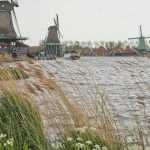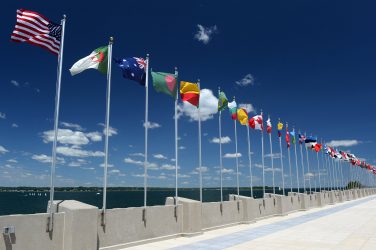I am writing this article in the aftermath of the Dutch elections held on March 15 2017. Almost everyone (from Merkel to Hollande to the Dutch media) seems to be happy (and relieved) with the ‘defeat of populism’: Wilders and his extreme-right party have not become the biggest party, as was feared based on the results of opinion polls. Hurray? I would not say so…
It’s almost like ‘populism’ is the new ‘terrorism’: the threat it proposes against liberal European democracies is used as a justification for the political status quo. The political establishment presents its own course as a stable and rational alternative to those ‘crazy populists’, deviating the attention from the enormous fault lines that have risen in Europe in the last years under the governance of this same establishment. This way, we are too busy talking about populism and there is no time left to talk about issues that really matter.

But before we go there, let’s start with the basics: to define what I mean when I say populism. I recently read a definition from Cas Mudde, a Dutch researcher specialized in political extremism and populism, which I considered very useful for me. According to Mudde, populism is an ideology that sees society as ultimately divided into two groups: ‘the pure people’ and ‘the corrupt elite’. Politics are being controlled by the corrupt elite, and therefore populists see it as their raison d’être to stand for the will of the people. Hence the discourse ‘us vs. them’ and the suspicion against everything that is part of the status quo: political parties, judges, media, etc. Usually populism goes hand in hand with extremism, either on the right or the left, and a nationalistic definition of ‘us’. Most European populists from the last decades have dug up the old romantic ideas of their nations as homogenous groups with shared ideas about their history, their values and their desires, and have used these ideas as a weapon in their fight.
However, what I want to talk about today is not so much populism itself as its impact on the discourse produced by European politicians, media and public opinion. A very striking example can be found when Donald Trump started to announce that he would build a ‘great, great wall’ between the US and Mexico. European leaders were quick to criticize this idea and to declare it impossible. Besides, Trump’s attempt to keep foreigners out found its climax in the so-called ‘Muslim ban’ or ‘migrant ban’ imposed in January. Again, European leaders and media were on the first row to criticize these actions and to denounce them as ‘immoral’, ‘unacceptable’ and ‘highly problematic’.
The pictures in this article, however, are not from the border between the US and Mexico. Instead, they show the reality of the external borders of ‘Fortress Europe’ – a reality which has become more and more agonizing and desperate in the last years. Fences and walls have been built in Ceuta, Hungary and Calais. Most of the southern border doesn’t need fences or walls as the Mediterranean does its job as ‘natural border’ pretty well. And oh, how relieved we were last year when the EU finalized its shameful deal with Turkey! Turkey agreed to stop migrants and war refugees to continue their journey to Europe in exchange for money and visa-free travel for Turkish citizens. Finally the ‘flood’ of migrants coming to Europe came to an end and very few critical voices were heard in Brussels.
Somehow the discussion in Europe is not about the miserable conditions in which thousands of refugees and migrants are living on the Greek islands, nor about the millions that are invested every year in border control. Somehow the discussion is focused on how Trump and Brexit were possible, and what to do to stop populist voices in this year’s elections.
Returning to my first paragraph, what we have been hearing is that populism has been defeated in the Netherlands. Rutte’s central-right party gained 33 seats in parliament, against 20 seats for Wilders’ PVV. In his victory speech in the night of March 15, Mark Rutte, prime-minister since 2010, proclaimed that the Dutch people had said ‘stop against the wrong kind of populism’. This needs to be seen in light of the tactic used by Rutte during his campaign, in which he positioned himself as a stable, safe and liable alternative to Wilders. Fair enough: Rutte does not use Twitter to send out angry messages into the world, nor does he use any clearly racist and xenophobic language or has he ever defended the ban of the Koran. However, ironically enough his message regarding immigration and integration isn’t that different from what Wilders is preaching.
In a television interview last Summer, Rutte was asked to give his opinion about a pro-Erdogan demonstration of people with a Turkish background in the aftermath of the failed coup in July 2016. During this demonstration, some people attacked a journalist and a cameraman and told them to leave. The reply of Rutte was, to say the least, controversial: ‘Just go back to Turkey yourself. Or get lost, as we say where I come from’. These words have haunted Rutte for several months, as many people saw this reply as not worthy of a prime-minister. Nevertheless, Rutte didn’t step back and used the same rhetoric to address integration issues during his campaign. In January a letter signed by Mr. Rutte himself was published in the biggest newspapers in the country. The message of the letter was clear: we, as a nation, need to defend what we stand for and we need to make clear what we consider as ‘normal’ in this country. People that do not want to adjust themselves to what we think is normal, need to leave.
The recent diplomatic fight between the Netherlands and Turkey (which took place just before the elections) was a perfect moment for Rutte to proof that he is indeed a stable and trustworthy alternative to Wilders, and that he is not only about words as well as deeds: whoever challenges the Dutch state and its sovereignty can count on a tough treatment. His tactic has clearly paid off, as he is now in charge of forming a new government. Rutte has played his cards well. But can we talk about xenophobic and nationalistic populism being defeated when the only answer that a central-right party found as alternative was, well, xenophobia and nationalism?

The impact of this kind of populism – whether it’s Trump, Le Pen, Alternative für Deutschland, or Wilders – on European politics is enormous. The central-right is taking over the same rhetoric in order to keep its voters, and the central-left is busy criticizing and even ridiculing any ideas proposed by the right-wing populist leaders. Media and politicians alike are talking about ‘the threat against liberal democracy’, avoiding a discussion about the current state and legitimacy of these same liberal democracies. In the meantime no one seems to be talking the growing fault lines and challenges within the EU.
Most of these challenges are a direct or indirect result of the action and inaction of our political leaders in the last decade(s). The welfare states are unable to cope with the combination of the harsh austerity measures of the last years and a growing population in need of health care and pension. The neoliberal approach of the EU towards globalization and international trade has been great for European citizens but tragic for several countries in the global South. The war and political unrest at the gates of the European Union have showed how dramatically unable the EU is to respond to crisis. The eurozone crisis remains as unbalanced as it has been since it was created and the search for solutions has vanished to the background. And last but not least, the persistent unwillingness of European leaders (and European citizens) to face the fact that people will continue to come to Europe as long as their own countries are being left behind has created a ‘refugee crisis’ that is, obviously, mainly a crisis for the refugees.
We need to remind ourselves why the EU was created: to assure peace and cooperation among European countries on long term. When this cooperation starts to be questioned, peace on the European continent starts to be at risk.
Nationalism, xenophobia and populism are not the answer. However, we need to stop to respond to these by repeating over and over again that the EU is really important. Instead we need to show why it’s so important. We need to remind ourselves why the EU was created: to assure peace and cooperation among European countries on long term. When this cooperation starts to be questioned, peace on the European continent starts to be at risk. We have to constantly make an effort to understand what the European project means in our daily lives, in terms of security, mobility, economy and education, and live up to this message. If we want the European project to survive, we need to seriously debate about these challenges and ask ourselves what we want the role of the EU to be in the world and how to accomplish this. We need to reconsider our external borders and accept that the more we try to stop other people from coming to enjoy the good European life, the more challenges we will create. We are not done here. As Jean Monnet, founding father of the EU, once said: ‘Have I said clearly enough that the Community we created is not an end in itself? It is a process of change, continuing in that same process which in an earlier period produced our national forms of life.










